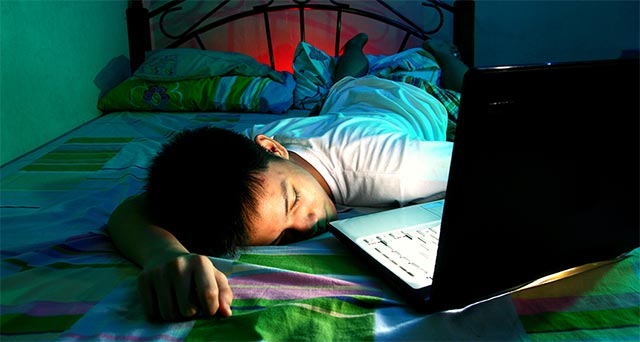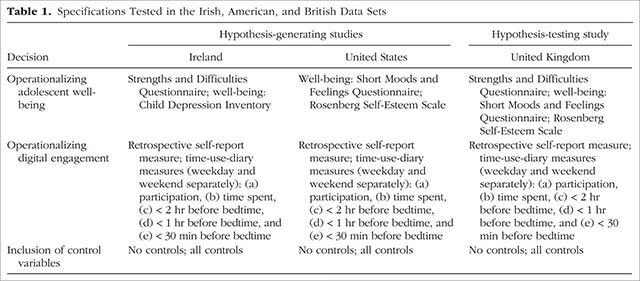'Eyes glued' to the screen before going to bed is not harmful to the mental health of the bar, teenager!
With wide coverage to every village road, lane of the internet, and the explosive development of smartphones makes this device become a separate object of many people, especially young people, probably not rare. You encounter situations where parents feel dissatisfied, or even angry when they see their children "glued" to the phone screen, laptop before going to bed because no one is familiar with the information. Using electronic devices before going to bed seriously affects the nervous system and sleep quality. However, a recent study has shown that there is absolutely no significant correlation between the habit of using the phone, the computer before bedtime and the health and psychology of a lack of year.

- 6 simple ways to minimize the harmful effects of sitting for a long time
Right! This study was conducted by two famous scientists Amy Orben and Andrew Przybylski of Oxford University. The duo proceeds to collect and analyze data from studies that monitor the screen usage time of electronic devices of a total of 17,000 young people from the UK, USA and Ireland. This data is then used to determine whether the amount of time that young people look at the screen before going to bed can affect their overall health? If so, how does it affect?
First of all, it is important to understand exactly what is the concept of time sitting in front of a screen time screen. According to the concept of being widely recognized by scientists, screen time is the time when a person focuses on looking at a computer screen, a gaming device or a mobile phone . to perform a specific task. such as playing games, texting, emailing, using social networks or watching movies, reading newspapers or even working.
- How to 'survive' with the stress of learning programming
Although many similar studies have been conducted in the past, there are still many concerns that the screen time self-reporting method is 'reminiscent' that participants often use in Many previous studies have yielded low accuracy.

- Attendance of 10 positions is strictly forbidden to place the phone
"Many in-depth analyzes have demonstrated that only one-fourth of the respondents gave accurate evaluations when asked about their time and their weekly Internet habits, while 42% were in that often gives slightly exaggerated answers, while the answers of the remaining 26% are often below the actual level, and those who are addicted to using the internet on electronic devices often have coins. A way to underestimate the amount of time they spend sitting in front of a device screen to surf the web, ironically, people who are not used to using the internet as well as electronic devices tend to be "serious". time screen time, resulting in the data they report often exceeds the actual level (Scharkow, 2016) .
Capturing this fact, in their research, two scientists Amy Orben and Andrew Przybylski have asked participants to fully and clearly record their screen time, instead of reporting data. in a "reminiscent" way, influencing the final outcome of the study.
Research by Amy Orben and Andrew Przybylski titled: 'Screens, Teens, and Psychological Well-Being: Evidence From Three Time-Use-Diary Studies' (temporarily translated: Screen, Youth and Psychological Health: Degree According to three names, the researchers from Oxford used the data collected by three other research projects. In Ireland, the United States and the United Kingdom, data from these studies are collected using a journal, recording the time policy that survey participants look at the screen. an electronic device.

- No sleep, no sex, no entertainment: Many tech workers in Chinese Silicon Valley are exhausted before the age of 30
In addition, to improve accuracy, researchers have also asked participants and their relatives to complete some specific questions to help identify factors such as emotional state and behavior. social and unfocused in the research process. The scale and complexity of this research can be seen and of course here we will not go further into that issue, but should pay attention to the results.
Accordingly, research by two scientists Amy Orben and Andrew Przybylski has shown that there is absolutely no clear correlation between screen time and mental health (psychological) of a teen .
"We have found very little evidence of a significant negative relationship between the time of using electronic devices with screens (measured throughout the day), or especially during the period before going. sleep and health status of adolescents. '
Besides, the researchers also focused on analyzing whether the use of the screen just before going to bed had any negative effects. The results are quite 'messy', but the final conclusion remains that there are no significant problems caused by screen time right before going to bed:
"Thirdly, this is also one of the first studies to consider whether the use of digital electronic devices just before bedtime has caused negative effects as well as disadvantages. For a long time, it seems that it is safe to say that using a digital screen right before bed can be more harmful to young people than they do. Spread out throughout the day To clarify this concept, we conducted surveys and collected specific recorded data from volunteers and analyzed and synthesized the results quite confusing. : Some argue that there are negative images, while others see this as positive or not causing any Therefore, our study has shown that using a computer monitor, a phone when sleeping may not be harmful to psychological health, although this is a common concept. The popularity is popular in mass media as well as in public debates. "

- Some simple stress relief and eye relaxation exercises
Although this study focuses on determining whether screen time will affect a user's health, there is one important thing you need to keep in mind: spending too much The time spent sitting in front of electronic devices will take away a considerable amount of other time that you should spend on activities that contribute to health promotion such as entertainment, sports, and even sleep. In addition, while not affecting psychological health, the use of the monitor for too long can also negatively affect physical health, such as wrong sitting postures affecting the joints, and thickening. especially vision impairment problems.